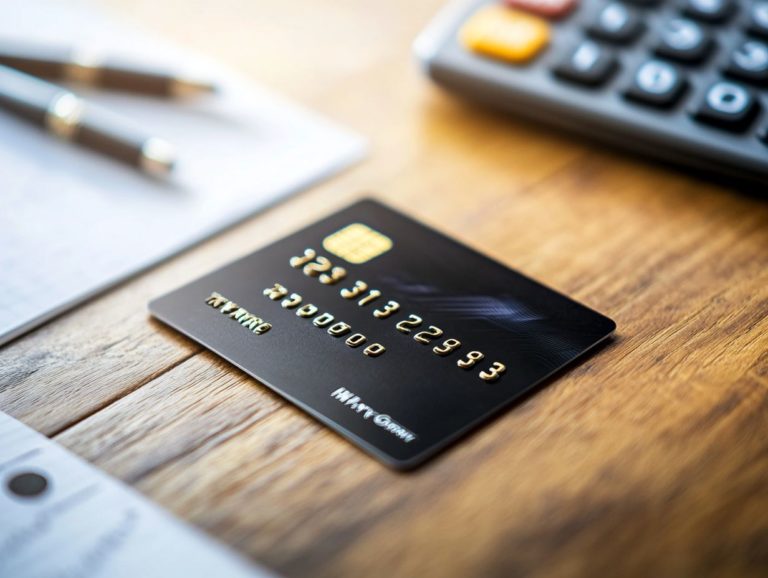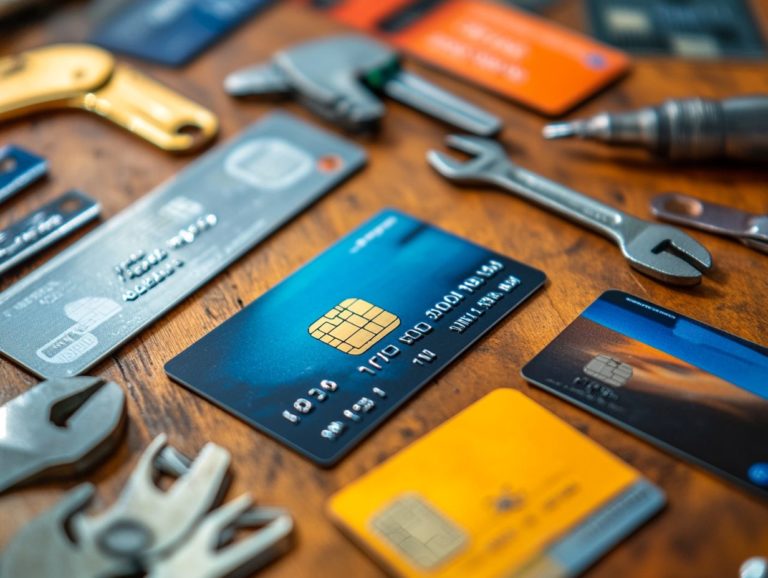How to Build Credit with a Business Card?
Building a solid credit profile is essential for your business. Yet, many entrepreneurs underestimate the significant advantages of a business credit card.
Understanding the nuances of business credit scores and how they differ from personal scores is key to leveraging this powerful financial tool effectively. Get ready to discover practical steps that will supercharge your business credit!
You ll also discover tips to maximize rewards while steering clear of common pitfalls. Get ready for a journey that could elevate your business s financial health!
Contents
- Key Takeaways:
- Mastering Business Credit Scores for Success
- Steps to Building Credit with a Business Card
- Other Tips for Building Credit with a Business Card
- Frequently Asked Questions
- What is a business card and how can it help me build credit?
- How does using a business card affect my personal credit score?
- Can I use a business card to build credit if I am a sole proprietor?
- Is it better to use a business card or a personal credit card to build credit for my business?
- How can I use my business card strategically to build credit?
- What are some other ways to build credit for my business besides using a business card?
Key Takeaways:

- Select a business card that aligns with your credit-building goals.
- Use the card responsibly by making timely payments and monitoring your credit score.
- Maximize rewards and benefits while avoiding common mistakes to effectively build your business credit.
Why Use a Business Card for Credit Building?
Utilizing a business card for credit building is a vital strategy for anyone looking to achieve financial independence and develop strong business credit. A business credit card acts as a powerful tool, enabling you to separate your personal credit from business expenses, and learning how to get the most out of your business credit card can enhance this process.
This helps establish a solid business identity and credit history.
By using a business credit card responsibly, you can enhance your creditworthiness and lay a strong financial foundation for future growth. This approach not only streamlines your accounting processes but also provides a chance to build credit with a credit card and create a formidable business credit profile.
This is crucial because better vendor agreements can lead to savings and improved cash flow. A robust business credit score can lead to lower interest rates and higher credit limits, allowing you the flexibility to invest in your growth while keeping your personal finances intact.
Having distinct business credit opens doors to partnerships and resources that may have previously felt out of reach, ultimately positioning you for greater long-term success.
Mastering Business Credit Scores for Success
Grasping the intricacies of business credit scores is essential for any entrepreneur aiming to secure financing and enhance their financial standing. Unlike personal credit scores, business credit scores are influenced by a variety of factors, including payment history and the amount of credit you’re using compared to your total available credit.
Esteemed credit rating agencies such as Dun & Bradstreet and Experian evaluate these scores, which are pivotal in assessing your creditworthiness and your capacity to negotiate advantageous vendor agreements. Understanding these elements can set you on a path to financial success.
How Business Credit Scores Differ from Personal Credit Scores
Business credit scores are worlds apart from personal credit scores, both in how they’re evaluated and the impact they have on your financial prospects. While personal credit scores primarily reflect your individual financial behaviors think payment history and credit card usage business credit scores take a much broader view.
They consider factors like company financials, business identity, and the overall creditworthiness of the business itself. In essence, personal credit assessments focus on your financial history, including your debt-to-income ratio and the length of your credit history.
In contrast, business credit evaluations delve into operational elements, such as revenue stability, payment practices with suppliers, and even the type of industry your business belongs to.
This distinction is crucial for entrepreneurs like you who are looking for loans or lines of credit. Lenders often place greater emphasis on the business credit score to assess risk, which directly influences the terms and conditions of any credit agreement you might enter into.
By understanding these differences, you can take charge of your credit management more effectively, customizing your strategies to fit your unique financial landscape.
Don’t wait! Start building your business credit today for a stronger financial future.
Steps to Building Credit with a Business Card
Building credit with a business card is a step-by-step process that requires smart money handling and responsible credit usage. To learn more about how to build credit with a credit card, you’ll need to follow specific steps, such as:
- Selecting the right business card
- Using it wisely
- Making timely payments
- Actively monitoring your credit score
This intentional approach not only bolsters your creditworthiness but also lays a solid foundation for future financial opportunities.
1. Choose the Right Business Card

Choosing the right business card is your first crucial step in the credit-building journey, as it directly impacts your credit limits and potential rewards programs. As you evaluate various options, take a close look at payment amounts, fees like Stripe or Square fees, and the specific benefits each card offers to ensure they align with your business goals.
It s vital to pay attention! Not just to interest rates which can differ significantly among choices but also to rewards programs that could boost your cash flow management over time.
Understanding the terms and conditions associated with each card, including annual fees, late payment penalties, and foreign transaction fees, will help you sidestep unnecessary costs. By carefully comparing these elements, you can identify a card that meets your immediate needs while supporting your overall financial strategy, setting the stage for sustainable growth.
2. Use the Card Responsibly
Using your card responsibly is crucial for building a positive business credit history and maintaining a favorable credit utilization ratio (the amount of credit you are using compared to your total available credit). To further enhance your creditworthiness, consider these tips for building credit with a credit card, aim to keep your balances low in relation to your credit limits, and prioritize on-time payments to sidestep penalties.
Keep an eye on your spending habits. This helps you avoid debt traps that could harm your credit score. Set a budget and stick to it to stay within your means while maximizing your credit potential. Regularly reviewing your credit reports allows you to identify any discrepancies or areas needing improvement.
Consistently managing your payment behavior whether by making payments early or utilizing automatic payments can further strengthen your credit standing. A disciplined approach to credit card use not only provides immediate financial flexibility but also paves the way for long-term business success.
3. Make Timely Payments
Timely payments are a cornerstone of building your business credit and upholding a robust payment history. You should consider setting reminders for due dates, ensuring that every payment to your credit providers is made in full and on time. Consistent, punctual payments not only bolster your reputation but also enhance your overall creditworthiness.
Incorporating strategies like auto-pay for regular expenses can streamline this process, significantly reducing the risk of missed payments. Leveraging digital calendars or apps to send alerts before each payment is due can serve as an effective safety net.
Don t forget! A solid payment history is essential for your financial future. It has a profound impact on your credit scores, which ultimately influence future financing opportunities. Lenders closely examine this history when reviewing loans or credit applications, making it essential for you to establish and maintain this habit.
4. Monitor Your Credit Score
Monitoring your credit score regularly is an essential strategy for maintaining and enhancing your business credit health. You should review your business credit reports from major credit rating agencies like Dun & Bradstreet and Equifax to identify any discrepancies and understand the factors that affect your creditworthiness.
This practice enables you to make informed financial decisions and plays a crucial role in securing favorable loan terms and building lasting relationships with suppliers. Set a schedule to check these reports at least twice a year. This helps you proactively address any potential issues. It s vital to dispute inaccuracies promptly; gathering supporting documentation will facilitate the necessary corrections.
Watch your financial history closely to prepare better for future investments and promote responsible financial habits within your organization.
Other Tips for Building Credit with a Business Card
Beyond the fundamental steps, there are several advanced strategies that can significantly enhance your credit-building efforts with a business card. Understanding how to choose a business credit card can elevate your overall financial management and strengthen your business reputation.
Consider leveraging trade credit, optimizing your payment history, and consulting with credible financial advisors who can help you navigate the complexities of credit building with finesse.
Maximizing Rewards and Benefits

Maximizing the rewards and benefits from your business credit cards can significantly elevate the value of your credit-building efforts. Take full advantage of the rewards programs offered by your business cards, while also seeking out attractive vendor agreements that provide additional perks and incentives.
Diligently analyzing various rewards options allows you to align your spending habits with programs that yield higher returns, such as travel points or cashback. Actively negotiating vendor agreements can lead to favorable terms that further boost your profitability.
Building robust relationships with suppliers not only strengthens your business network but can also unlock exclusive discounts or loyalty benefits, which can be pivotal in optimizing your overall financial management.
Avoiding Common Mistakes
Avoiding common mistakes is essential for successful credit building with your business card; these missteps can significantly impact your credit utilization ratio and overall financial history. Act now to avoid overspending and late payments; these mistakes can damage your credit score.
To cultivate a positive credit profile, you must diligently track your spending and pay off your balances in full each month. Keeping your credit utilization below 30% is another vital guideline that helps maintain a healthy credit score. Regularly reviewing your credit reports allows you to spot inaccuracies that could impede your financial independence.
Many overlook the importance of establishing a robust payment history; consistently making payments on time is one of the most significant factors influencing credit scoring. By staying informed about these aspects of credit management, you can create a solid foundation for your financial journey.
The Importance of Building Business Credit
Building business credit is crucial for you as an entrepreneur aiming for financial independence and access to more favorable corporate credit options. A robust business credit profile opens the door to cheaper financing, improved vendor agreements, and a stronger reputation in the marketplace.
Establishing a solid business identity not only boosts your credibility but also nurtures long-term relationships with financial institutions. When you consistently show good credit habits, securing loans with advantageous terms becomes much easier think lower interest rates and extended repayment periods.
This financial leverage enables you to make strategic investments, fostering growth and innovation without straining your cash flow. A well-maintained credit history also enhances your ability to negotiate better terms with suppliers and partners, ultimately contributing to a healthier financial ecosystem. This sets the stage for you to pursue your goals with confidence and determination.
Frequently Asked Questions
Here are some common questions to help you understand how to build your business credit.
What is a business card and how can it help me build credit?
A business card is a credit card specifically designed for small business owners. It can help you build credit by allowing you to make purchases and pay them off over time, thus establishing a positive credit history. Additionally, understanding how to use business credit cards for rewards can further enhance your financial strategy.
How does using a business card affect my personal credit score?

Using a business card can have a positive impact on your personal credit score if you make timely payments and keep your credit utilization low. However, if you miss payments or carry a high balance, it can also have a negative effect on your score.
Can I use a business card to build credit if I am a sole proprietor?
Yes, as a sole proprietor, you can use a business card to build credit. Just make sure to apply for a business card under your business name and use it solely for business expenses. For more insights, check out this guide on how to use business credit cards effectively.
Is it better to use a business card or a personal credit card to build credit for my business?
It is recommended to use a business credit card to build credit for your business. This will help keep your personal and business finances separate, making it easier to track and manage your expenses. Additionally, learning how to leverage business credit cards for growth can further enhance your financial strategy.
How can I use my business card strategically to build credit?
To build credit effectively, use your business card for necessary business expenses and make timely payments. Aim to keep your credit utilization below 30%, and consider how to rebuild credit with a business card by making larger payments or paying off the balance in full each month.
What are some other ways to build credit for my business besides using a business card?
Other ways to build credit for your business include taking out a small business loan, applying for a business line of credit, and making timely payments on any existing business debts. Additionally, learning how to rebuild your credit with a credit card can also enhance your credit profile. Having a diverse mix of credit can help you build a powerful credit profile!
Don t wait to act start building your credit today!






